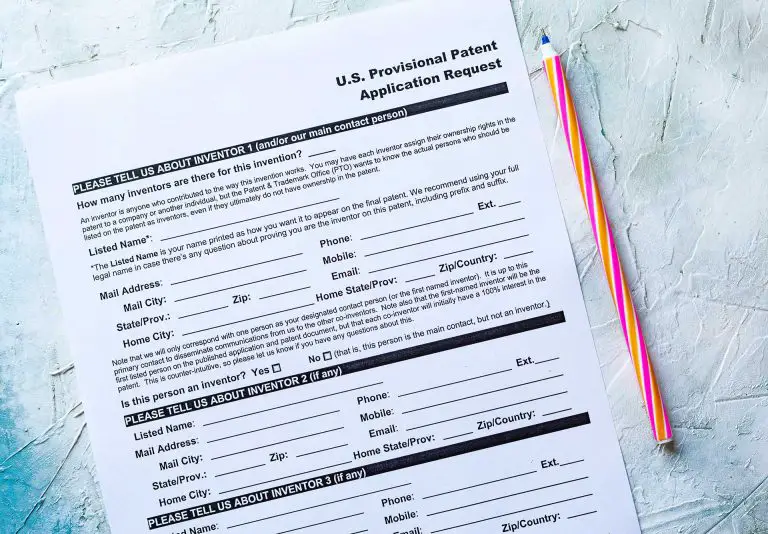Where do Patent Agents Work?
If you’re looking for a new career or you’re just wondering where patent agents work, you’ve come to the right spot. Patent agents typically hold a degree in engineering or science, and they assist inventors and applicants to patent their inventions or designs at the USPTO (The United States Patent and Trademark Office).
Patent agents typically work with patent attorneys, experts, and other professionals to assist inventors with preparing a patent application, filing it with the patent office, and communicating with the patent office to get a patent application approved.
Where Do Patent Agents Work?
Patent agents typically work at law firms, the patent office, as a solo patent agent, or as an in-house patent agent for a private company. Many patent agents are hired by clients to assist them with the preparation of high-quality patent applications, filing them with the patent office, and prosecuting them to obtain the best possible patent protection for their clients.
That said, before a patent agent can represent clients before the USPTO, a person must have passed the patent bar exam and is licensed to assist inventors with patenting their inventions or designs. Patent agents must have a strong background in science or engineering and they must be good communicators. This is so because a majority of their work depends on explaining how things work to others. So, having strong oral and written communication skills is very important. So, what does a typical day for a patent agent look like?
On a typical day, the patent agent may be approached by an inventor who has an invention or an idea that he wants to patent. The job of the patent agent is to first assess the patentability of the invention and then offer the inventor help with the preparation, filing, and prosecution of his patent application.
Patent agents typically assist inventors that have an invention that’s within the field of their experience. For example, a patent agent with a background in software engineer is best suited to assist inventors who want to patent a piece of software.
Patent Agent Job Duties (What Does a Patent Agent Do?)
A patent agent’s job duties include meeting with inventors to understand how their invention works, as well as the possible applications for the invention. Once a patent agent has a grasp on how the invention works, as well as its application, he can assess the patentability of the invention by conducting a prior art search to determine whether someone else has already patented or publicly disclosed the invention that his client wants to patent.
If the prior art search does not reveal any inventions that are the same as the inventor’s invention, the patent agent can then proceed to prepare a patent application for his client. As part of the patent application, the patent agent has to describe the invention in a manner that will allow the patent examiner to understand how to make the invention, as well as how the invention works.
Once a patent agent has prepared a patent application, he has to file it with the patent office and pay the required fees. After the patent agent files the patent application, his responsibilities include communicating with the patent office on behalf of his client. The patent office may require the patent agent to make amendments and/or changes to the patent application.
Basically, most of the work a patent agent performs involves drafting patent applications and responding to communications from the patent office. Patent agents also spend a large portion of their time communicating with inventors to help them protect their inventions.
How Much Do Patent Agents Make?
According to numbers we obtained from Glassdoor, the average patent agent makes between $95,000 and $121,00 per year. The salary of a patent agent depends on the agent’s experience. The more experience a patent agent has, the more he or she will earn. Patents agents who are starting off their careers, earn on average $89,000, whereas experienced patent agents, having 10+ years of experience, earn $156,000+.
How do You Become a Patent Agent?
To become a patent agent, you must have a bachelor’s degree in the fields of science or engineering. Once you’ve completed your science or engineering degree, you can become a patent agent by preparing for and passing the USPTO registration exam, commonly referred to as the patent bar exam. The patent bar exam is made up of 100 multiple-choice questions, to become a patent agent you must correctly answer 70% of the questions. Passing the patent bar exam, allows you to represent inventors before the USPTO.
What is the Difference Between a Patent Agent and a Patent Attorney?
The main difference between a patent agent and a patent attorney is that a patent attorney has attended law school and has passed the general bar exam, as well as the patent bar exam. On the other hand, most patent agents have not attended law school and are therefore unable to practice law.
That said, both patent agents and patent attorneys are licensed by and registered with the USPTO. Both are able to assist inventors in preparing and filing their patent applications, as well as prosecuting their clients’ patent applications. Patent agents are not allowed to represent their clients in matters outside the patent office.
For example, if a client is involved in a patent infringement lawsuit, a patent agent who is not licensed to practice law, it not allowed to appear in court to represent an inventor. An attorney, however, is able to represent a client in matters before the patent office, as well as other legal matters and court proceedings.
So, if you’ve been wondering is a patent agent is a lawyer? The short answer is that they’re not lawyers, but they can represent clients before the patent office, they can also help clients with the preparation and prosecution of their patent applications.
What Do Patent Agents Do?
As previously mentioned, a patent agent assists inventors with patenting their inventions and designs. Assistance with patenting inventions includes the following: collecting information, drafting patent applications, filing patent applications with the USPTO, prosecuting patent applications, and communicating with the patent office on behalf of their clients.
For someone who likes drafting legal documents, this is the perfect job because patent agents spend a majority of their time drafting applications and communicating with the patent office to get their clients’ inventions the best possible patent protection.
Clients are allowed to represent themselves when patenting their invention, however, the patent office recommends that inventors have a patent attorney or patent agent assist them with the patenting process. Some inventors don’t have the money to hire patent attorneys, so some choose the assistance of qualified and experienced patent agents, who can perform most tasks that patent attorneys can perform when seeking to patent an invention.
Our Advice to Someone Who Wants to Become a Patent Agent
If you’re a patent agent and you’re looking at a law firm to join as a patent agent, the best thing you can do is to gain as much real-world experience as possible. By this, we mean getting your hands dirty by gaining experience drafting and prosecuting patent applications. Take a job that you don’t like to gain the experience that you need to get the job that you love.
Law firms want patent agents who have experience in the field of their degree. For example, if you have an electrical engineering degree, try to get as much experience as possible in drafting and prosecuting patent applications that relate to the electronics industry. Choose a law firm that’s looking to hire attorneys with your type of experience.
For example, if you have a decent background in electrical engineering, don’t apply to a law firm that’s looking to hire a patent agent with experience in pharmaceuticals. Even though the job title “Patent Agent” may be the same, the experience and qualifications are much different between the two fields.
Where Does a Patent Agent Work?
As earlier discussed, most patent agents work as solo practitioners, law firms, in-house patent agents, or the patent office. Patent agents earn a decent amount of money, the more experience a patent agent has, the more money he will be able to earn. To become a patent agent, an individual must have a science or engineering degree and must pass the patent bar exam. Patents agents can represent clients before the patent office to patent their inventions. We covered most of the questions that we get. If you have any additional questions or comments, please feel free to leave them in the comments section below.








